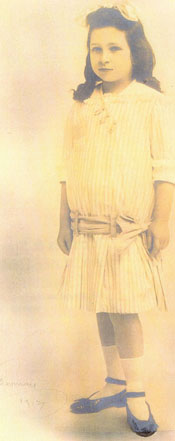
Viola W. Bernard, age 7
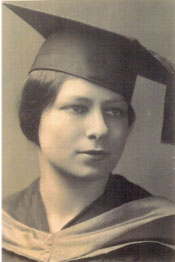
Viola W. Bernard, at her graduation
from Cornell Medical School in 1936
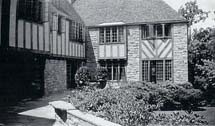
During World War II, Bernard housed
European war refugees at her family's summer home, Sky Island
Lodge, in Nyack, New York.
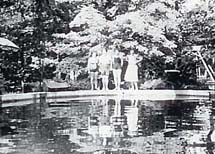
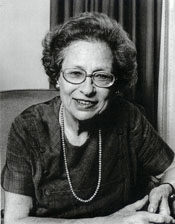
Viola W. Bernard in 1977
|
|
Viola Bernard was a pioneering
social psychiatrist whose vision of mental health presumed fundamental
links between the lives of communities and the lives of individuals.
Causes such as civil rights, peace, and urban poverty, she believed,
were determining factors in child and family welfare, and Bernard
pursued them actively throughout her life. Her conviction that adoption
was a critical mental health issue left an enduring mark on the
adoption world while illustrating her theoretical loyalty to community
psychiatry and her practical efforts to increase its influence.
A professional leader committed to exploring the powerful social
forces that infused human behavior and relationships, Bernard believed
that events within individuals, interactions between individuals,
and relationships among social institutions were all interconnected,
subject to scientific inquiry, and in urgent need of rational management.
She was a dedicated clinician who also conducted research on the
psychosocial dimensions of fertility and infertility
and followed cases of adopted twins separated at birth in order
to probe the nature-nurture
problem. But it was her pursuit of liberal social justice that illuminated
important developments in adoption history during the middle third
of the twentieth century. Not least of these was the increase in
numbers and kinds of children considered adoptable: African-American
children, children with disabilities, children with special
needs.
Bernard maintained a lengthy and entirely uncompensated relationship
with Louise Wise Services, one of the country’s first
specialized adoption agencies. During her 40 years as Chief
Psychiatric Consultant and her fifty years as Board Member, Bernard
served as both godmother and gadfly to the agency, urging an array
of practical and moral reforms. The result was the agency’s
transformation from a sectarian organization devoted to Jewish adoptions
before World War II (when it was still called the Free Synagogue
Child Adoption Committee) into a national innovator in services
geared to children of color in the 1950s and 1960s. Along with Justine
Wise Polier (whose mother, Louise Wise, was the agency’s
founder), Bernard worked to insure that the agency’s staff
was racially integrated and that its placements exemplified the
goal of non-discrimination. She was proud that her agency established
an Interracial Adoption Program in 1952 that actively recruited
minority adoptive families and experimented early on with transracial
adoptions. During the course of the Indian
Adoption Project, Louise Wise Services placed more native children
than any other private agency in the country.
Bernard’s thinking about adoption was shaped by the particulars
of her personal background and professional training. She was born
in New York in 1907 to Jacob Wertheim, a wealthy German-Jewish businessman
and philanthropist, and his second wife, Emma Stern. Like Justine
Wise Polier, a childhood friend, Bernard benefited from educational
privileges that were rare among American women at the time. After
attending the Ethical Culture School in New York, she took college
courses at Smith, Barnard, Johns Hopkins, and New York University.
Bernard’s life as a young adult was exceptional in other ways
as well. She lived in an ashram, called the Clarkstown Country Club,
where she practiced yoga and studied eastern philosophy long before
these became fashionable. Through Clarkstown, she met and married
Theos Casimir Bernard, a scholar of Tibetan Buddhism. The marriage
lasted four years. Bernard never remarried or had children. She
lived at 930 Fifth Avenue in Manhattan for most of her adult life,
accompanied by a succession of beloved dogs.
In 1936, Bernard graduated from Cornell University Medical School.
She then pursued a series of psychiatric residencies as well as
training at the New York Psychoanalytic Institute. She belonged
to the first psychiatric generation after Sigmund
Freud and maintained that Freud’s psychodynamic theory
was the source of crucial insights into infertility,
adoptee identity, and the controversies that surrounded confidentiality
and sealed records as well as search
and reunion. Like her colleague and mentor, Marion Kenworthy,
who helped bring psychiatric social
work into being, Bernard was genuinely interested in how psychiatry
might learn from other professions as well as what it might offer
to them. Bernard’s effort to make psychoanalysis more widely
accessible—by establishing the country’s first low-cost
psychoanalytic clinic at Columbia University—was typical of
her campaign to make mental health services much more widely available.
Bernard’s long career was marked by professional distinction
and social engagement with a wide range of causes, from civil rights
and civil liberties to peace and nuclear disarmament. She was a
founding member of the Group for the Advancement of Psychiatry,
an important interest group within the American Psychiatric Association
that anticipated the increasingly social and psychodynamic orientation
of psychiatry during the postwar era. She was a vocal defender of
Alger Hiss, target of one of the most notorious espionage cases
of the early Cold War. Bernard herself was suspected of “un-American”
activities and was investigated in 1951-1952 by the Federal Security
Agency. Bernard signed the social science statement, “The
Effects of Segregation and the Consequences of Desegregation,”
that influenced Brown v. Board of Education, the 1954 landmark
case that ended educational segregation in the United States. Bernard’s
wish to see racial barriers dismantled extended to her own profession
as well. As an unofficial career counselor for minority psychiatrists,
Bernard thought progress had occurred when she no longer knew every
African-American psychiatrist in the United States personally. Moved
by the famous exchange on war between Sigmund
Freud and Albert Einstein, Bernard participated in the meetings
of the Pugwash Conferences on Science and World Affairs, which were
eventually awarded the Nobel Peace Prize.
Professional, political, and personal action were not distinct
realms of activity for Bernard. In 1971-1972, she was elected Vice-President
of the American Psychiatric Association on a historic opposition
slate protesting the Vietnam War. In the world of child welfare
advocacy, her affiliations included the Citizens’ Committee
for Children of New York, the Bureau of Child Guidance of the New
York City Board of Education, and the Wiltwyck School for Boys.
During World War II, she allowed her summer home, in Nyack, New
York, to be used by the American Friends Service Committee to house
refugees from Nazi Germany. From 1956 through 1969, she directed
the Division of Community and Social Psychiatry at Columbia University's
medical school, where she oversaw a training program dedicated to
carving out a large and multi-faceted jurisdiction for psychiatry.
The administrative and organizational demands of social psychiatry,
Bernard believed, were unavoidable, but they also created an occupational
hazard of excessive distance between practitioners and the communities
they served. It was appropriate for social psychiatrists to reform
laws related to child and family mental health, for example, but
legal advocacy might distract from the daily struggles of individuals
unless it was consciously balanced with the ongoing practice of
psychotherapy.
Known by close friends and family as “Vi,” Bernard
was by all accounts a very forceful personality: at once charismatic,
opinionated, loyal, intimidating, admirable, and absolutely determined
to achieve her goals. Her personal assistant for more than twenty-five
years, Dr. Kathleen Kelly, calls her “unforgettable”
and “a sparkling human being. “She was extremely exacting
and demanding, and set very high standards for herself and everyone
who worked with her.” Dr. Perry Ottenberg, a friend and colleague
of Bernard’s who now serves as President of the private foundation
she established, recalls that “Viola was cultured, raised
in upper middle class wealth, a world traveler, yet spoiled her
poodles, buried her fichus tree each winter with ceremony and served
home made juices and strong alcoholic drinks.”
Bernard's ideas about the relationship between personal and social
psychology were as brilliant and complicated as she was. Bernard
believed that everything was always related to everything else,
and she dubbed her encompassing approach “ecological”
before that term was popularized by environmentalists. Bernard’s
intellectual ambition was daunting and she wrote with great difficulty,
“carving each word out of stone,” according to her niece
Joan Wofford. Students sometimes found it difficult to follow her
elaborate, meandering train of thought. It is a testament to Bernard’s
formidable intellect and energy that she so often succeeded in solving
problems and demanded equity so effectively on behalf of disadvantaged
children and families.
Adoption epitomized the preventive psychiatry to which Bernard
devoted her entire career. Bringing children and adults together
required diagnostic skill and professional collaboration, and Bernard
valued both. But adoption was far more than a series of steps that
resulted in the formation of new families. It was a life-altering
and lifelong therapeutic process of “psychic rearrangement.”
“The central social reality of adoption,” she wrote,
“is its power to prevent misery and maldevelopment of children
who lack families of their own.” Adoption contributed to the
mental health of its participants by repairing the traumas of infertility
and separation from parents while psychiatric insights into illegitimacy
and clinical practices like mental tests and home
studies insured the psychological viability of adoption.
Bernard knew that there were no guarantees in adoption. She recounted
the story of eleven-year-old Sarah, whom she personally removed
from a disastrous adoptive placement, as “one of the most
painful tasks I have encountered,” “a psychiatric equivalent
of radical surgery.” But Sarah’s case was exceptional,
according to Bernard. Most placements conducted under the auspices
of professional agencies were managed well. Children were observed
closely, parents were selected carefully, and the result was “a
remarkable human experience” that prevented a great many more
problems than it caused. Bernard’s belief in the “affirmative”
qualities of adoption was one reason why she objected so vigorously
to the argument that adoption placed children at greater
risk for psychopathology,
a thesis advanced by Marshall
Schechter and other clinicians during the 1960s. In the absence
of convincing proof that adoption led to maladjustment, anything
that undermined public confidence in adoption was a tragedy for
public health and child welfare.
Bernard’s ideas shaped and reflected powerful trends in the
adoption field, and in psychiatry, during the middle third of the
twentieth century. Her career suggested how confident modern adoption
reformers were in the promises of regulation, professsionalization,
scientific knowledge, and therapeutic approaches. “The guiding
principle of modern adoption practice,” Bernard wrote, is
“the application. . .of the best that is known about
family living in general to the special circumstances of adoption.”
|



